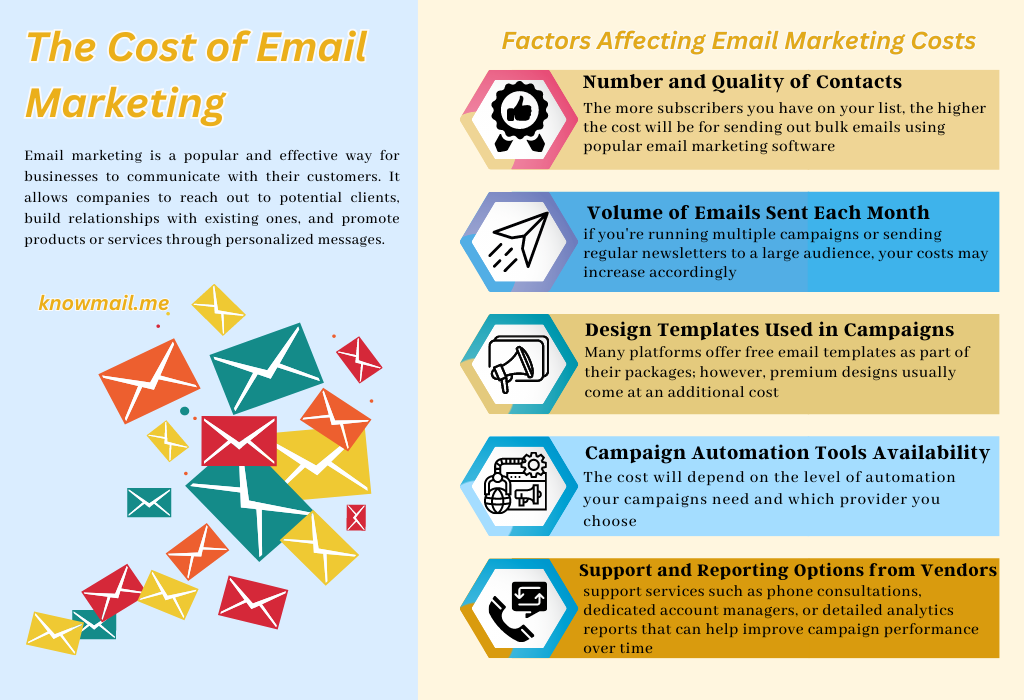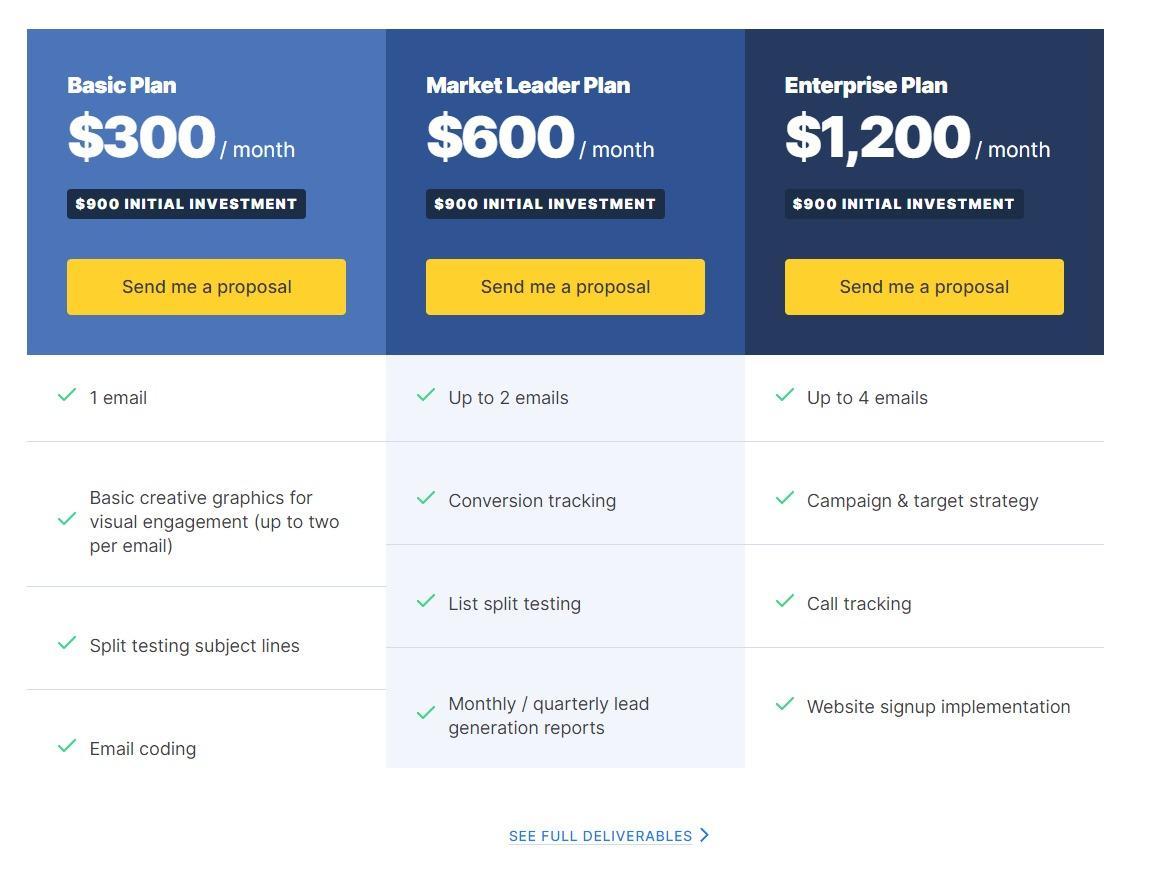How much will an email marketing campaign cost you? The answer depends on several factors.
Email marketing is one of the most effective ways to reach your audience. But before you start, you need to know the costs involved. The price of an email marketing campaign can vary based on factors like the size of your email list, the type of content you send, and the tools you use.
Understanding these costs helps you plan your budget and make informed decisions. Let’s dive into the details and see what affects the cost of an email marketing campaign.
Introduction To Email Marketing Costs
Email marketing can be cost-effective. But how much will it cost you? This depends on several factors. Understanding these costs helps you plan better. It ensures you get the best return on investment.
Importance Of Budgeting
Budgeting is crucial in email marketing. It helps you allocate resources wisely. You can avoid overspending. Proper budgeting ensures every dollar counts. This way, you can maximize your campaign’s effectiveness.
Factors Influencing Costs
Several factors influence email marketing costs. The size of your email list affects costs. Larger lists require more resources. The quality of your email content also matters. High-quality content may need professional design and copywriting. The choice of email marketing software is another factor. Some tools offer basic services for free, while others charge for advanced features.
Frequency of emails impacts costs too. Sending more emails means higher costs. Finally, consider any additional services. Analytics, automation, and segmentation tools can add to the cost. Understanding these factors helps you budget better. This ensures your campaign stays within your financial limits.
Types Of Email Marketing Campaigns
Email marketing campaigns come in different types, each serving a unique purpose. Understanding these types will help you plan your budget better. Here are the three main types of email marketing campaigns:
Transactional Emails
Transactional emails are automated messages sent after a user performs an action. Examples include order confirmations, receipts, and password resets. These emails are crucial for customer service and user experience.
| Type | Example |
|---|---|
| Order Confirmation | Sent after a purchase is made |
| Receipt | Sent after a payment is processed |
| Password Reset | Sent when a user requests a new password |
Promotional Emails
Promotional emails aim to drive sales and conversions. They often include special offers, discounts, and product announcements. These emails are key to boosting sales and engaging customers.
- Special Offers
- Discounts
- Product Announcements
Automated Email Sequences
Automated email sequences are pre-scheduled emails sent based on user behavior. They help nurture leads and guide users through the sales funnel. Examples include welcome series, onboarding sequences, and re-engagement campaigns.
- Welcome Series
- Onboarding Sequences
- Re-engagement Campaigns
Cost Components Breakdown
An email marketing campaign involves several cost components. Understanding these components helps in budgeting and planning. Below, we break down the key costs involved in running an email marketing campaign.
Email Software Fees
Email software is essential for managing your campaigns. These tools help with sending emails, tracking performance, and managing subscriber lists. The cost of email software varies based on features and the number of subscribers.
- Basic Plans: $10 – $30 per month
- Mid-Level Plans: $30 – $100 per month
- Advanced Plans: $100 – $300 per month
Some popular email software options include Mailchimp, Constant Contact, and SendinBlue.
Content Creation Costs
Creating engaging content is vital for the success of your campaign. Costs depend on whether you do it in-house or outsource it. Here’s a breakdown:
- In-House: Salary of content writer, typically $40,000 – $60,000 per year
- Freelance Writers: $50 – $200 per email
Quality content increases open rates and conversions. Investing in good content pays off.
Design And Template Expenses
Designing attractive email templates enhances user engagement. You can choose between pre-designed templates or custom designs. Here’s a cost overview:
- Pre-Designed Templates: $0 – $50 per template
- Custom Designs: $100 – $500 per template
Tools like Canva and Adobe Spark offer affordable design options.
Choosing The Right Email Marketing Platform
Choosing the right email marketing platform is crucial for your campaign’s success. It can make or break your budget. With so many options available, it can be overwhelming. This section will help you understand and compare different platforms. This way, you can make an informed decision.
Popular Platforms Comparison
Here are some popular email marketing platforms:
| Platform | Features | Price Range |
|---|---|---|
| Mailchimp | User-friendly, Automation, Analytics | $0 – $299/month |
| Constant Contact | Templates, List Management, Support | $20 – $95/month |
| Sendinblue | Transactional emails, SMS marketing | $0 – $66/month |
Free Vs Paid Options
Free options are great for small businesses or startups. They offer basic features like:
- Email templates
- Basic analytics
- Limited subscribers
Paid options provide advanced features that can benefit larger campaigns:
- Advanced segmentation
- Automation workflows
- Detailed analytics
- Priority support
Evaluate your needs and budget to choose the best option. Free plans might save you money but paid plans offer more comprehensive tools.
Estimating Campaign Costs
Estimating the costs for an email marketing campaign can be challenging. Knowing the factors that influence these costs will help you plan your budget. It also helps to maximize the impact of your emails.
Calculating Per Email Costs
Start by calculating the cost per email. Look at your email platform’s pricing. Many platforms charge based on the number of subscribers or emails sent. For example, some platforms charge $10 for 1,000 emails. This means each email costs you $0.01.
Consider the costs of email design and content creation. Hiring a designer or writer adds to your expenses. You might spend $100 on a custom email template. Divide this by the number of emails sent to find the cost per email for design and content.
Monthly And Annual Budgeting
Plan your budget on a monthly and annual basis. Estimate the number of emails you will send each month. Multiply this by the cost per email to find your monthly expense. For example, if you send 5,000 emails a month at $0.01 per email, your monthly cost is $50.
To find your annual budget, multiply your monthly cost by 12. This gives you a clear picture of your yearly email marketing expenses. Always set aside a buffer for unexpected costs. This ensures you have enough funds to cover any surprises.

Credit: smtpmaster.com
Ways To Save On Email Marketing
Trying to save money on email marketing? You can reduce costs and still create effective campaigns. Use these tips to keep your budget in check without compromising quality.
Diy Vs Professional Services
Doing it yourself saves money upfront. You won’t pay agency fees. You have control over every aspect. But it demands time and effort. You need to learn best practices and tools. Mistakes can cost you more in the long run.
Professional services handle everything for you. They have expertise and experience. They know what works and what doesn’t. You pay for their skills and knowledge. The results can justify the expense. Weigh the pros and cons before deciding.
Utilizing Free Tools
Many free tools help you create and manage campaigns. Mailchimp offers a free plan for small lists. You can send up to 10,000 emails per month. It includes templates and basic analytics.
Other tools like Sendinblue and MailerLite also have free plans. They provide essential features for small businesses. Use free trials to test different tools. See which one fits your needs best.
Free tools can limit advanced features. But they are perfect for beginners or small businesses. Start small and upgrade as your needs grow.
Measuring Roi Of Email Campaigns
Understanding the return on investment (ROI) of your email marketing campaigns is crucial. It helps in determining the effectiveness and profitability of your efforts. By measuring ROI, you can identify what works best and adjust strategies accordingly.
Key Performance Indicators
Key Performance Indicators (KPIs) are essential metrics that help measure the success of your email campaigns. These indicators give a clear picture of how your campaigns are performing. Here are some important KPIs to consider:
- Open Rate: The percentage of recipients who open your email.
- Click-Through Rate (CTR): The percentage of recipients who click on links within your email.
- Conversion Rate: The percentage of recipients who complete the desired action.
- Bounce Rate: The percentage of emails that could not be delivered.
- Unsubscribe Rate: The percentage of recipients who opt out of your email list.
Analyzing Campaign Success
Analyzing the success of your email campaigns involves examining the KPIs and other relevant data. This analysis helps in understanding the impact of your emails on your audience. Here are some steps to analyze your campaign success:
- Compare open rates across different campaigns to identify trends.
- Analyze click-through rates to determine which links attract the most attention.
- Monitor conversion rates to see how many recipients take the desired action.
- Evaluate the bounce rate to improve your email list quality.
- Track the unsubscribe rate to understand if your content is relevant to your audience.
By carefully analyzing these metrics, you can refine your email marketing strategy. Focus on improving areas that show lower performance and maintain practices that yield positive results.

Credit: www.knowmail.me
Advanced Budgeting Tips
Planning an email marketing campaign requires careful budgeting. Advanced budgeting tips can make your campaign more effective and cost-efficient. Let’s explore some strategies to help you manage your budget better.
Scaling Your Campaigns
Start small with your email campaigns. Test different strategies and see what works best. As your audience grows, gradually increase your budget. This helps you avoid wasting money on ineffective campaigns. Track your performance regularly. Use analytics to adjust your budget based on results.
Allocating Resources Efficiently
Divide your budget wisely across different aspects of your campaign. Allocate funds for email software, content creation, and analytics tools. Prioritize quality over quantity. Invest in good content that engages your audience. Use automation tools to save time and money. Efficient resource allocation can maximize your return on investment.

Credit: www.facebook.com
Frequently Asked Questions
How Much Does Email Marketing Cost?
Email marketing costs vary. It can range from $10 to $1,000 per month. The price depends on the number of subscribers and email frequency.
What Factors Influence Email Marketing Costs?
Several factors affect email marketing costs. These include the size of your email list, email frequency, and the email marketing service provider you choose.
Are There Free Email Marketing Tools?
Yes, there are free email marketing tools available. However, they often have limitations on the number of emails and subscribers.
How To Budget For An Email Marketing Campaign?
To budget for an email marketing campaign, consider your goals, list size, and email frequency. Determine the features you need and choose a suitable plan.
Conclusion
Calculating the cost of an email marketing campaign depends on various factors. These include the size of your email list, the tools you use, and the type of content you send. It’s important to set a budget that aligns with your business goals.
Remember, investing in quality content and tools can enhance your results. By understanding these elements, you can better plan and manage your email marketing expenses. Start small, track your progress, and adjust as needed. This approach helps you maximize your return on investment while keeping costs manageable.



Leave a Reply